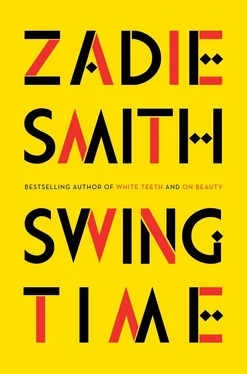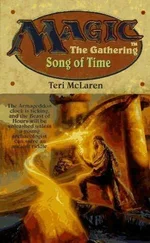He had not moved toward me but I found myself backing away from him, until I was up against the trunk of the mango tree.
“What are you doing here? What experience do you have in this work? This is adult work! You behave like a teenager. But you’re not a teenager any more, are you? Isn’t it time you grew up?”
I burst into tears. Somewhere a bell rang. I heard Fernando sigh with what sounded like sympathy, and I had a wild hope, for a moment, that he was about to put his arm around me. With my head in my hands I heard hundreds of kids burst from their classrooms and run through the yard, laughing and shouting, on their way to their next lessons, or out of the gates to help their mothers on the farm, and then Carrapichano kicking the leg of his chair, toppling it and walking back across the yard to class.
Twelve
The end of my own middle passage came in midwinter, the perfect time to be a Goth: you’re in tune with the misery all around you, like that clock that’s right twice a day. I was on the way to my father’s, the bus doors wouldn’t open for the height of snow already in front of them, I had to force them apart with my black leather gloves and step down into a drift, protected from the intense cold by steel-capped black DMs and layerings of black jersey and black denim, by the heat of bird’s-nest Afro hair, the fug of hardly ever washing. I had become an animal perfectly adapted to its environment. I rang my father’s doorbell: a young girl answered the door. Perhaps she was twenty. Her hair was in very basic twists, she had a sweet teardrop of a face and flawless skin that shone like the peel of an aubergine. She looked fearful, smiled nervously, turned around, and called my father’s name, but with such a thick accent it was hardly his name at all. She disappeared and was replaced by my father and after that she didn’t come out of his bedroom for the rest of my visit. As we walked through the dilapidated communal hallway, past the curling wallpaper, rusted mail boxes, filthy carpet, he quietly explained to me, as if he were a missionary and a little bashful to reveal the true extent of his charity, that he had found this girl in King’s Cross station. “She was barefoot! She’d nowhere to go, nowhere at all. You see, she’s from Senegal. Her name is Mercy. You should have rung to say you were coming.”
I ate dinner as usual, watched an old movie— The Green Pastures— and when it came time to go, and still nothing more about Mercy had been said by either of us, I saw him look back over his shoulder at his bedroom door, but Mercy did not reappear, and after a while I left. I didn’t tell my mother or anyone at school. The only person I felt would understand was Tracey, and I hadn’t seen her in months.
• • •
I’d noticed that other people had this adolescent gift for “spiraling out of control,” of “going off the rails,” but whatever catch inside of themselves they managed to release in times of sadness or trauma I wasn’t able to find in myself. Instead, self-consciously, like an athlete deciding on a new training regime, I decided to go off the rails. But no one took me very seriously, least of all my mother, for she considered me a fundamentally reliable teenager. When other local mothers stopped her in the street, as they often did, to ask advice about their wayward sons and daughters, she would listen to them sympathetically but without any concern on her part, sometimes bringing the conversation to a close by putting a hand to my shoulder and saying something like: “Well, we’re very lucky, we don’t have those sorts of problems, not yet.” This narrative was so cemented in her mind that any attempt I made to stray from it she simply couldn’t see: she was attached to a shadow-me and followed this instead. And wasn’t she right? I was not really like my new friends, not especially self-destructive or reckless. I hoarded (unnecessary) condoms, was terrified of needles, too afraid of blood generally to contemplate cutting myself, always stopped drinking before truly incapacitated, had a very healthy appetite, and when I went clubbing would sneak away from my crew — or conspire to lose them — at around a quarter past midnight, so that I could meet my mother, whose rule it was to pick me up at exactly half past the hour every Friday night, outside the stage door of the Camden Palace. I’d get into her car and bitch spectacularly about this arrangement while always, secretly, feeling grateful it existed. The night we rescued Tracey was like that, a Camden Palace night. Normally, my circle went to an indie night there, which I could just about tolerate, but this time we had gone for some reason to a hardcore show, shredded guitars distorting the huge speakers, a raging noise, and at a certain point I realized I wasn’t going to make it till midnight — even though I’d battled with my mother for exactly this dispensation. Around eleven thirty I said I was heading to the bathroom and stumbled through that old theater, once a vaudeville place, found a spot in one of the empty booths on the first floor and set about getting drunk on the little bottle of cheap vodka I carried around in a pocket of my black trench coat. I knelt on the threadbare velvet where the chairs had been ripped out and looked down into the mosh pit. I got a sad sort of satisfaction from the thought that I was very likely the only soul in the place at that moment who knew that Chaplin had played here, and Gracie Fields, not to mention all the long-forgotten dog acts, family acts, lady hoofers, acrobats, minstrels. I looked down at all those disaffected suburban white kids dressed in black, hurling themselves at each other, and imagined in their place G. H. Elliott, “The Chocolate-Colored Coon,” dressed head to toe in white, singing of the silvery moon. Behind me I heard the curtain swish: a boy walked into my booth. He was a white boy, very skinny, no older than me, and clearly high on something, with deep-pitted acne and a lot of dyed black hair falling over his cratered forehead. But his eyes were a beautiful blue. And we were of the same ersatz tribe: we wore the same uniform, the black denim, black cotton, black jersey, black leather. I don’t think we even spoke to each other. He just came forward and I faced him, already on my knees, and reached up for his fly. We undressed as minimally as possible, lay back on that ashtray of a carpet and became attached at the groin for a minute or so, while the rest of our bodies remained apart, each swaddled in its layers of black. It was the only time in my life that sex occurred without its shadow, without the shadow of ideas about sex or fantasies regarding it of the kind that can only accumulate over time. On that balcony all was still exploratory, experimental, and technical in the sense of figuring out exactly what went where. I’d never seen any pornography. That was still possible then.
It seemed wrong for Goths to kiss so we bit gently at each other’s necks like little vampires. Afterward he sat up and said in a much posher voice than I’d expected: “But we didn’t use anything.” Was it his first time, too? I told him it didn’t matter, in a voice which probably surprised him just as much, and then asked him for a cigarette, which he gave me in the form of a pinch of tobacco, a Rizla and a square of cardboard. We agreed to go down to the bar and get a snakebite together, but on the staircase I lost him in a crowd surging upward, and suddenly desperate for air and space I made my way instead to the exit and out into Camden at the witching hour. Everyone was barrelling around half-lit, falling out of the pubs, in their torn denim and check or black-on-black, some sitting on the floor in circles, singing, playing guitars, others being told by a man to see another man, further down the road, who had the drugs that the first man was meant to have. I felt at once brutally sober, lonely, and wished my mother would appear. I joined a ring of strangers on the ground, who looked to be from my tribe, and rolled that fag.
Читать дальше












